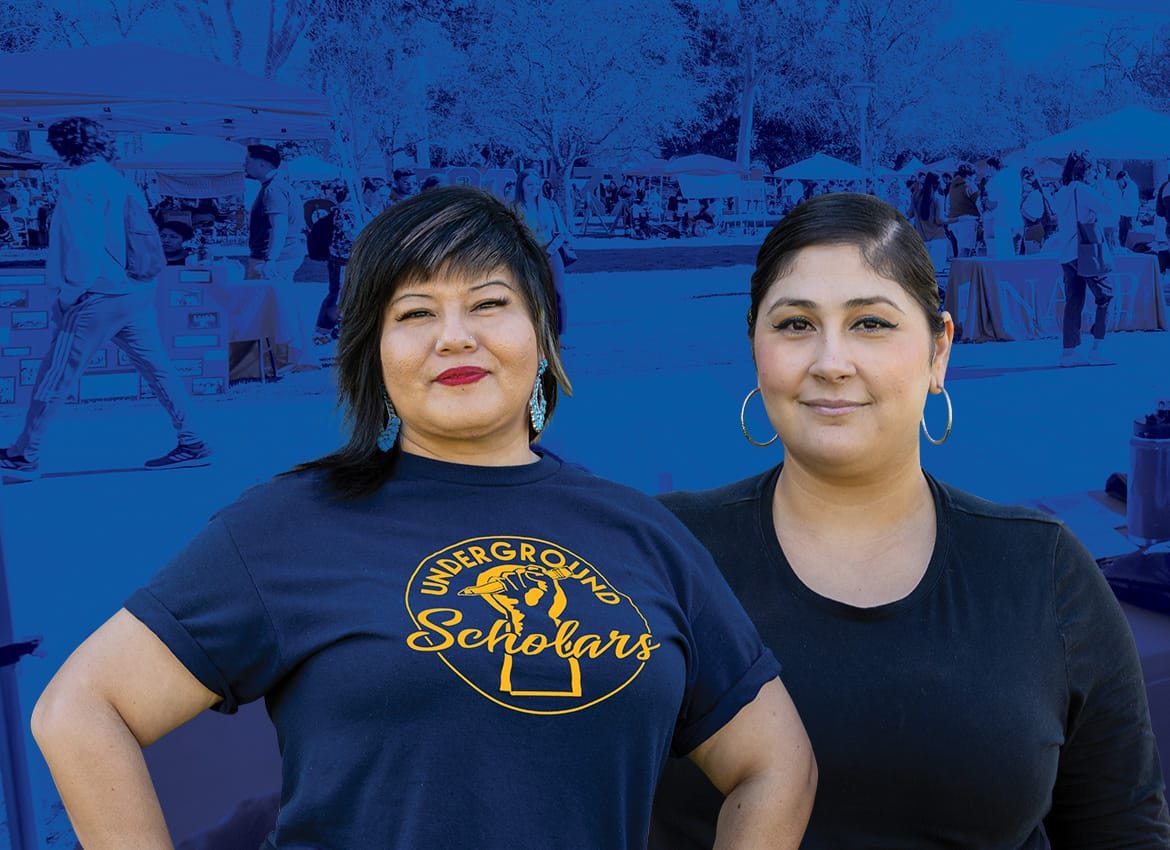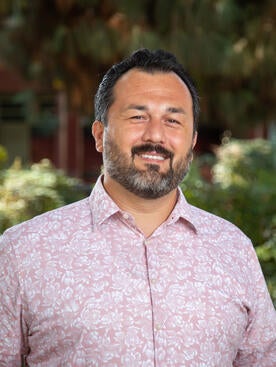
FROM THE GROUND UP
Celebrating five years on campus, UCR’s Underground Scholars are building on the program’s mission to form a prison-to-school pipeline with new funds, a new focus on wellness, and a new director
By Malinn Loeung | Photos by Stan Lim
I f UCR’s Underground Scholars are reluctant to share the experiences that brought them to the program, it’s not because of shame, but public perception. Founded in 2013 at UC Berkeley by formerly incarcerated and system-impacted students, the Underground Scholars Initiative, or USI, was established at UCR in 2018 and now has chapters on every UC campus. In tandem with UCR’s student-led USI chapter, the state-funded Riverside Underground Scholars, or RUS, program is creating pathways into higher education for incarcerated, formerly incarcerated, and system-impacted individuals — those with arrests or convictions but no incarceration or who have been directly impacted by a family member’s incarceration.
While USI actively challenges stigmas associated with incarceration and aims to cultivate a sense of belonging and community, its members still face many hurdles on their higher education journey. Like many college students in the Inland region, Underground Scholars struggle with affordable housing, food insecurity, reliable transportation, and increasing tuition. But they are also marred by an extra dose of discrimination often placed on people who have carceral connections.
“I am system-impacted. Both my parents have been incarcerated, and so have several family members,” said Creiselda Terpoorten, USI vice president, who is pursuing a master’s degree in UCR’s School of Public Policy. “Unfortunately, my father was murdered by lethal force while incarcerated, which has plagued my family. The carceral system makes families feel like their loved ones are not worthy to advocate for because they are or were ‘criminals.’”
Formerly incarcerated persons are also subject to exclusionary policies and practices that limit employment opportunities — a key factor in avoiding recidivism. A 2008 study from the Prison Policy Initiative estimates the unemployment rate for formerly incarcerated persons at about 27%, compared to just over 5% for the general population. Research has also shown one of the most effective interventions for reducing recidivism is higher education. According to a 2016 report from the United States Sentencing Commission, offenders with less than a high school diploma had the highest recidivism rates at 60.4%, followed by high school graduates at 50.7%, and those with some college at 39.3%. College graduates had the lowest rates at 19.1%.
“The carceral system makes families feel like their loved ones are not worthy to advocate for because they are or were ‘criminals.’”
— Creiselda Terpoorten, USI vice president
“It was during my incarceration at California Institution for Women that I was given the opportunity to participate in the community college program and earn my associate degree,” said USI member Genevieve Silva, who is pursuing a bachelor’s degree in sociology. Upon my release, I continued my education by working on transfer credits. An Underground Scholars student that I knew from work encouraged me to apply to UCR and become involved with the program. I hadn’t even thought of a UC being a possibility, but with that encouragement, I applied to UCR and became a part of Underground Scholars.”

Now in its fifth year on campus, USI has made significant strides in its goal to increase access to higher education for formerly incarcerated and system-impacted persons. Thanks to grants from the Mellon Foundation and Crankstart Foundation secured in 2021, USI has been able to hire paid student workers, develop additional programing, host more events, and address other needs. As the result of a successful statewide funding initiative, it was announced in July 2022 that $4 million in ongoing funding would be allocated from the state budget to support USI across the UC campuses, with $424,000 earmarked for UCR. The additional funding will be used to support advocacy efforts, members’ basic needs and wellness, and scholarships for students in the program. USI members hope the new funding will also lead to a larger gathering space for its membership, which is currently 123 students.
In addition to its work toward education equity, USI has expanded its focus to address “wellness,” which was added as a fourth pillar in its mission of “recruitment, retention, and advocacy” throughout the UC campuses last year. To that end, UCR’s USI board members organized a grant committee with their first goal being to secure funds for mental health initiatives. Although none of the members had experience with grant writing, their efforts were successful and USI was awarded $15,000 from UCR’s Mental Health Innovation Fund. Designed to support innovative programming or studies that contribute to mental health awareness, research, prevention, and promotion efforts, the funds have been used to develop and host the student workshop “Making Trauma Care Culturally Inclusive” and the student panel discussion “Destigmatizing Addiction & Understanding Recovery” in collaboration with UCR’s Counseling and Psychological Services and The Well.
“I’ve had more family members incarcerated than have graduated high school, none of whom have been given the opportunity to even consider college. We must humanize and uplift this population that society has labeled as invaluable.”
— Amanda Soto, USI secretary
“Being system-impacted, I have witnessed the effects of intergenerational trauma that has led to incarceration and substance abuse,” said Amanda Soto, USI secretary, who is pursuing a bachelor’s degree in ethnic studies.
“I’ve had more family members incarcerated than have graduated high school, none of whom have been given the opportunity to even consider college. We must humanize and uplift this population that society has labeled as invaluable.”
But the biggest item checked off their 5-year wish list was the hiring of their first full-time program director. Ismael Davila, who earned a master’s degree in higher education leadership and student development from California Baptist University, joined USI in June and serves as director of RUS, which operates under UCR’s Office of Diversity, Equity, and Inclusion. Historically guided solely by a student board, USI members hope Davila’s 10 years of experience in the community college, foster youth services, and juvenile detention sectors will arm the program with bureaucratic knowledge students aren’t privy to and aid in the continued development and expansion of USI.
“My goals this year are to get more formerly incarcerated students to attend UCR and into the program,” Davila said. “I want to see if we can get 60 more students by the end of the academic year.”
Since joining USI, Davila has introduced intake forms, quarterly checkups, and participation agreements, such as a commitment to attend one workshop. As a formerly incarcerated person, Davila hopes his own background and career path will help students feel more comfortable sharing their stories and pique the interest of future USI members. As for his current cohort of Underground Scholars, Ismael hopes to establish solidarity.
“It may take a year to gain their trust, but I mean what I say, and I do what I say,” Davila said. “I want students to know, ‘my dreams get accomplished when you accomplish yours.’”
2013
Underground Scholars is established by formerly incarcerated and system–impacted students at UC Berkeley.
2014
Underground Scholars at UC Berkeley receives funding from a fee referendum, establishing office space and hiring a director, transfer coordinator, and five formerly incarcerated student workers.
2016
Underground Scholars at UC Berkeley partners with state Sen. Loni Hancock to secure funding from the state to develop an academic support program for formerly incarcerated students. Berkeley Underground Scholars is born out of this effort, and the statewide movement of USI begins.
2018
UCR’s USI chapter is established.
2021
With the establishment of a chapter at UC Merced, USI becomes a UC-wide initiative.
2022
USI is named “Best Student Organization” by UCR students. Ismael Davila is hired as UCR’s first full-time director of RUS.
2023
UCR’s USI chapter celebrates five years with a current membership of 123 students.
